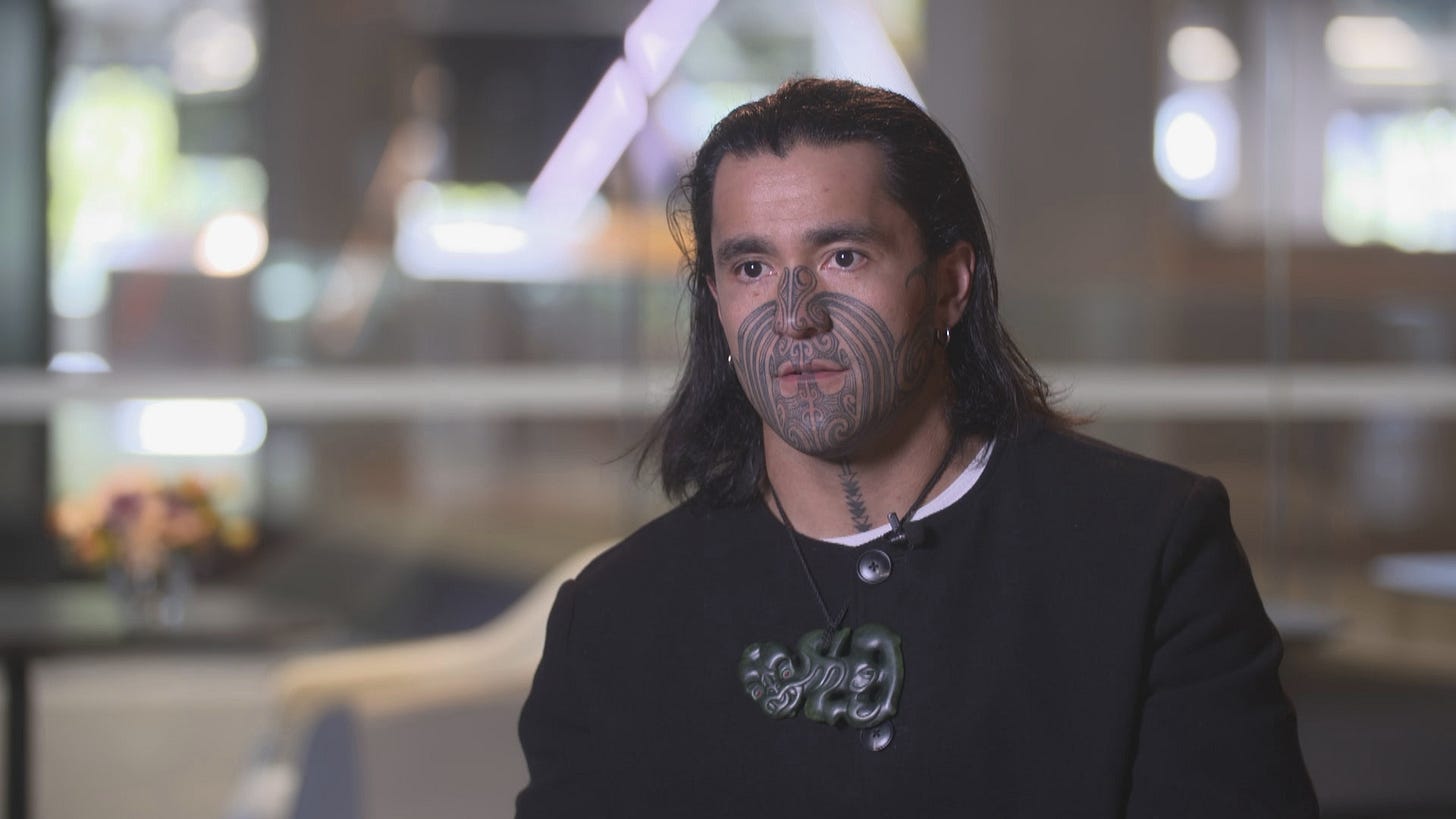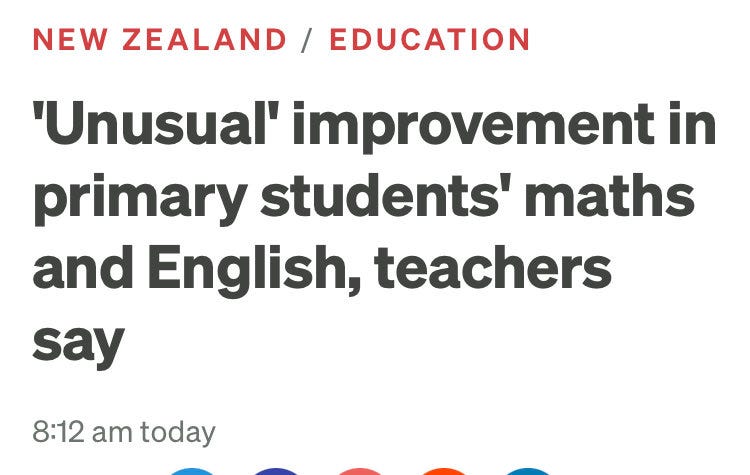Literacy and numeracy gains: good news that media seem reluctant to believe
This week an ERO review revealed that New Zealand’s primary students are showing early signs of improvement in maths and English. More than half of teachers reported higher achievement this year compared to last, a shift described as “unusual” given how slow systemic change normally is.
New entrant phonics data released by the Ministry show a startling leap in early reading achievement just two school terms into Minister Erica Stanford’s structured literacy reforms. In Term 3, 58% of students were at or above expectations, up from just 36% in Term 1, and 43% exceeded expectations, more than double the initial rate. The share of children needing significant extra support also fell dramatically from 52% to 33%. Māori students at or above expectations rose from 25% to 43%, while in low-decile schools, success jumped from 18% to 35% and Pacific students climbed from 27% to 43%. According to Minister Stanford, these improvements are tangible proof that structured literacy, taught universally from Day 1, is making more confident readers and narrowing long-standing equity gaps.
Yet in much of the public conversation, this news was greeted with skepticism, or in language that conveys these are Government “claims” rather than independent results. Even where reporters mention the incredible improvements, the coverage tends to focus more on problems still to be solved (gaps in algebra instruction, uneven implementation) rather than on celebrating what is significant progress against a long term trend of decline.
Yet in much of the public conversation, this news was greeted with skepticism, or in language that conveys these are Government “claims” rather than independent results. Even where reporters mention the incredible improvements, the coverage tends to focus more on problems still to be solved (gaps in algebra instruction, uneven implementation) rather than on celebrating what is significant progress against a long term trend of decline.
Trump’s peace deal fragile but holding
A USA–mediated agreement led to a ceasefire between Israel and Hamas this week, timed with a mass hostage/prisoner exchange. Under the deal, Hamas released 20 living hostages in Gaza in return for the release of several hundred Palestinian criminals, most in prison for acts of terror and violence. The ceasefire was heralded as a diplomatic breakthrough, a rare moment of respite after years of relentless escalation, and President Trump has been widely praised for his efforts toward peace.
But the deal is still in a fragile place with Hamas failing to handover all of the bodies of deceased hostages, while some released remains were later found not to match known hostages. Meanwhile, during the ceasefire window, both sides traded accusations of violations. Hamas claimed Israel had killed dozens of Palestinians; Israel accused Hamas of propaganda and stalling. Then Hamas broadcast images of themselves executing Palestinian civilians they accused of treason or working with Israel.
In New Zealand, the very same media who had been running the narrative that Israel was a genocidal foreign force in Gaza and must be ejected immediately, began reporting that Palestinians were being killed by Hamas because Trump withdrew Israeli forces. And despite two years of near-constant screeching from Chloe Swarbrick and the Greens, the huge news of a ceasefire and potential end to conflict was studiously ignored by them. They eventually commented to say that Trump deserved no credit.
Te Pāti Māori drama: factionalism, allegations, and leadership risk
The Te Pāti Māori in-fighting is an ongoing soap opera. This week petrol was poured onto the open flame with lengthy allegations emailed to party members accusing Toitū Te Tiriti leader (and former Te Pāti Māori Vice President) Eru Kapa-Kingi, and his mother MP Mariameno Kapa Kingi, of financial misconduct. Additionally, the contents of complaints about Eru, written Parliamentary security staff, were made public by Te Pāti Māori and they did not paint a pretty picture.

Eru Kapa Kingi Source: 1News
Radio NZ reported the Parliamentary security guard wrote that Eru had showed “complete disregard toward security” after being caught tailgating through the main entrance security gates, despite having a family member swipe card.
“Eru has said to me that he doesn’t have to do anything I say or show me the relevant Parliament ID because I am not a cop and I’m just a security guard who can’t do s**t.”
In the long, frank report of the incident, Eru is described as having adopted an “aggressive tone and came across with a lot of hatred and intimidation”. He attacked the two staff members present racially multiple times, calling one a “f***ing white baldhead c***”. Security felt strongly that Eru should be banned from Parliament and that “with the combination of the abuse, language and racism displayed by Eru, I firmly believed that he was going to go through with his threats of physical violence.”
The staffers also recorded that Eru repeatedly referred to who his family is and that they would be embarrassed and “f***ed” when they found out. His diatribe was peppered with comments like “you are just a piece of s***”, “f*** you c***” and “get f****d”.
It is highly unlikely that this ugly incident from 2024 was not brought to the attention of Te Pāti Māori leadership, however they claim to have only just been made aware of it and say they made it public for transparency.
Potential for racial tension: MACA amendment and gene tech co-governance
Two legislative fronts now loom that could intensify already toxic racial tensions in New Zealand politics. First, the Marine and Coastal Area Amendment Act (MACA) is set to be passed with the objective of restoring Parliament’s intentions when it first passed in 2011. Since then the judiciary has blown out what was meant to be a high threshold for customary rights claims to the extent that now almost the entire coast of the country is under claim by various iwi.
The backlash has been disorganised with Te Pāti Māori distracted with their own drama, but MP Takuta Ferris has called on the Governor General to “block” the bill.
The narrative that the MACA is an attack on Māori rights is false and ahistorical. MACA was passed by National in 2011 to restore the ability for Māori to make customary rights claims on coasts and shores after Labour’s Foreshore and Seabed Act 2004 put all of it in Crown ownership. These amendments tidy it up to rein in the judiciary’s excesses, but still protect the right to claim. Many New Zealanders would probably prefer Helen Clark’s old legislation!
Second, the Gene Technology Bill is emerging as a potential flashpoint in the culture wars, not only in debates over biotechnology but in how “tikanga Māori” is embedded in science regulation. Under the proposed regime, a Māori Advisory Committee would have formal influence (eg equal weighting) over licensing decisions on genetically engineered organisms, even to veto if a “kaitiaki relationship” is deemed harmed. This opens the door to race-based rent-seeking and undermines scientific governance. New Zealand First and Act have both registered concern and demanded changes to the Bill, and the Taxpayers’ Union and Hobson’s Pledge have both called for race to be taken out of it.
Serial rapist reoffended while on bail and I am fuming
I am so angry as I write this I am not confident I will be able to convey the details concisely. It is likely I will write something longer about it at some stage, but here it is in short. Rage with me.
In Tauranga this week, a jury found Jayden Meyer guilty of sexually violating a 15-year-old girl. You might remember his name, he’s the same man who was convicted of raping four 15-year-old girls and sexually violating another and then walked away with 9-months home detention. Yes, you read that right. Justice Christopher Harding said a sentence of imprisonment was typical for the level of offending Meyer had committed and was “undoubtedly correct”, but then cited the probation report and submissions as reasons to ignore this. He sentenced a serial rapist to home detention.

Serial rapist Jayden Meyer. Photo source: NZ Herald / Ethan Griffiths
After a public backlash, the Crown appealed the sentence and in the High Court Justice Sally Fitzgerald described the sentence as being “manifestly inadequate” but for reasons I have been unable to ascertain anywhere she then said “in the unique circumstances of this case, the interests of justice are best served by declining the Crown’s application”. Yeah.
This is not some tragic anomaly. It’s the direct result of a justice system that puts offenders before victims. Judges who think they’re showing “mercy” to offenders like Meyer are instead endangering women and girls. This latest sexual violation occurred literally only hours after he’d been bailed after being charged with the rapes and sexual assaults against the five other girls. Meyer had been arrested at 5pm on June 18, 2021 and was released into his father’s custody two hours later. Despite one of his bail conditions being that he could not be unsupervised with females under 16, his father let a group of teenagers including girls under 16, hang out in his room. As we know, he then sexually violated one of them.
Serial rapist Meyer has now finally found himself behind bars having been remanded in custody before sentencing next year, in relation to this most recent case. I swear to God if he gets home detention again it’ll finish me off.
Read more: New Zealand Herald.
RBNZ loosens the reins: Easier home loans on the way for first-home buyers
In a notable shift, the Reserve Bank of New Zealand has announced it will ease loan-to-value ratio (LVR) restrictions from 1 December 2025. The changes will allow 25% of new owner-occupier mortgages to go to buyers with deposits under 20%, up from the current 20% ceiling. Acting Assistant Governor Angus McGregor explained the timing was right because house prices are now roughly 16% below their 2021 peak and lending growth remains moderate, with limited high-risk exposures. The Bank added that existing debt-to-income (DTI) rules will remain in force to protect against overextension. The move will give banks more flexibility, especially benefitting first-home buyers, though critics warn it could reignite speculative demand if not carefully managed.
Local elections and Māori ward referenda: mixed signals for democracy and representation
The 2025 local body elections delivered a jumble of outcomes. Several councils saw shake-ups, and the looming special votes still promise surprises. Wayne Brown is back in charge of Auckland, Andrew Little takes over Wellington, and Phil Mauger has secured a second term as mayor of Christchurch. But perhaps most striking was the wave of “No” votes against Māori wards across many councils. While Māori wards were retained in some places, the broader pattern suggests deep ambivalence, or resistance, among portions of the electorate to race-based representation mandates. There is one electoral fraud complaint lodged in Auckland, alleging that vote papers were stolen from letterboxes. Turnout fell in many areas, raising questions about civic fatigue and disengagement.
MP for Auckland Central missing in action as electorate struggles
The New Zealand Herald ran an informal poll online last week:
More than 6100 people responded online to the question on our site: “Do you believe Auckland CBD has become an uninviting destination for the public beset by anti-social behaviour and neglect?” And 97% responded yes.
The Herald pointed to business groups who echo the sentiment of the poll. A Heart of the City survey found 91% of CBD operators say homelessness and begging are hurting trade, and 81% say the city centre can’t attract investment in its current state. Business leaders cited public sex acts, open drug-taking, begging, and violent incidents as making their staff feel unsafe. According to 72% of respondents, not enough was being done by police and Auckland Council to ensure existing laws and bylaws were being enforced.
Meanwhile, OIA documents have revealed that despite her loud public positioning on homelessness and social issues, Chlöe Swarbrick has met with Auckland’s mayor only once in 19 months to discuss homelessness and the one time it was discussed it was just one of several issues. This echoes how missing in action her co-leader was when she was Associate Housing Minister: Homelessness.
Click to view
BSA overreach: watchdog extends its reach into online media
In a move that has sparked a fierce backlash, the Broadcasting Standards Authority (BSA) has effectively claimed it now has jurisdiction over online content (eg podcasts, internet radio, maybe even social posts), asserting that “telecommunication” includes internet delivery. The dispute erupted after the BSA advised The Platform that they were proceeding with a complaint laid against them regarding Sean Plunket calling tikanga “mumbo jumbo”. This was significant because until now, it has been accepted that the BSA doesn’t have jurisdiction over the internet and in fact it has previously called for the Government to amend legislation to expand its remit to fix this.
Stacey Wood, Chief Executive of the BSA, told Mike Hosking on Newstalk ZB that they would even treat social media content on a “case-by-case” basis. TikTokers beware!
The Free Speech Union, David Seymour, and Winston Peters have come out all guns blazing to denounce the action by the BSA. Minister in charge of Broadcasting, Paul Goldsmith, has said it is an operational matter and he cannot comment.
Fashion Police: Gerry Brownlee edition… I’m here for it
Speaker Gerry Brownlee has announced that he intends to crack down harder on parliamentary standards, not just in behaviour and attendance, but in dress and decorum. This followed the drama of last week when Orinii Kaipara’s maiden speech ran far longer than the prescribed time and then turned into New Zealand’s Got Talent with waiata and haka.
The Greens were incensed about the prospect of dress standards, accusing Brownlee of overreach and cautioning against turning the Speaker into the “fashion police.” Green MP Ricardo Menéndez March warned that Parliament is “intergenerational” and multicultural, and that enforcing a narrow dress standard risks diminishing representation. Meanwhile, Labour and National have expressed support (with caveats), saying that expectations of decorum are reasonable, though not all agree that a tie should be mandatory again.
🇬🇧 Batshit Britain: nothing to see here except it isn’t safe for Jews to watch football
Last week, leaked remarks made by UK Shadow Justice Secretary Robert Jenrick resurfaced in which he described a visit to Handsworth, Birmingham as “absolutely appalling” and “as close as I’ve come to a slum in this country.” He claimed the area was “one of the worst integrated places I’ve ever been to,” adding that during the 90-minute span when he was filming, he “didn’t see another white face.” He qualified that “it’s not about the colour of your skin or your faith…but I want people to be living alongside each other, not parallel lives.”
Local figures, politicians, and community leaders accused Jenrick of mischaracterising Handsworth, exaggerating problems, and fueling divisive racial narratives.
Ironically, yesterday it was confirmed that no ‘away’ supporters will be permitted at Aston Villa’s upcoming Europa League fixture against Maccabi Tel Aviv, after Birmingham council’s Safety Advisory Group did not approve the allocation of seats that ‘away’ fans would normally have at the urging of West Midlands Police. Authorities cited intelligence around potential protests, recent unrest, and past violent clashes, like the Tel Aviv fans who were attacked in a pogrom in Amsterdam last year. It is clear that the fears are about the violence visiting Israeli fans would likely face in Birmingham which has a large Muslim population. The decision has stirred heavy criticism from political leaders and Jewish organisations, some calling the ban discriminatory, but officials maintain it is a precaution to protect public safety above all else. Why are the potential victims being banned though? Maybe Jenrick had a point.
RIP, the Right Honourable Jim Bolger
Jim Bolger died this week. He served as Prime Minister of New Zealand from 1990 to 1997, leading the Fourth National Government. A farmer turned statesman, he was tough but decent; conservative but capable of reform; and even his critics admit he understood the balance between compassion and constraint better than most. He was proof that in New Zealand you can leave school at 15 to work on the family farm, and run the country one day.
BSA overreach: watchdog extends its reach into online media
In a move that has sparked a fierce backlash, the Broadcasting Standards Authority (BSA) has effectively claimed it now has jurisdiction over online content (eg podcasts, internet radio, maybe even social posts), asserting that “telecommunication” includes internet delivery. The dispute erupted after the BSA advised The Platform that they were proceeding with a complaint laid against them regarding Sean Plunket calling tikanga “mumbo jumbo”. This was significant because until now, it has been accepted that the BSA doesn’t have jurisdiction over the internet and in fact it has previously called for the Government to amend legislation to expand its remit to fix this.
Stacey Wood, Chief Executive of the BSA, told Mike Hosking on Newstalk ZB that they would even treat social media content on a “case-by-case” basis. TikTokers beware!
The Free Speech Union, David Seymour, and Winston Peters have come out all guns blazing to denounce the action by the BSA. Minister in charge of Broadcasting, Paul Goldsmith, has said it is an operational matter and he cannot comment.
Fashion Police: Gerry Brownlee edition… I’m here for it
Speaker Gerry Brownlee has announced that he intends to crack down harder on parliamentary standards, not just in behaviour and attendance, but in dress and decorum. This followed the drama of last week when Orinii Kaipara’s maiden speech ran far longer than the prescribed time and then turned into New Zealand’s Got Talent with waiata and haka.
The Greens were incensed about the prospect of dress standards, accusing Brownlee of overreach and cautioning against turning the Speaker into the “fashion police.” Green MP Ricardo Menéndez March warned that Parliament is “intergenerational” and multicultural, and that enforcing a narrow dress standard risks diminishing representation. Meanwhile, Labour and National have expressed support (with caveats), saying that expectations of decorum are reasonable, though not all agree that a tie should be mandatory again.
🇬🇧 Batshit Britain: nothing to see here except it isn’t safe for Jews to watch football
Last week, leaked remarks made by UK Shadow Justice Secretary Robert Jenrick resurfaced in which he described a visit to Handsworth, Birmingham as “absolutely appalling” and “as close as I’ve come to a slum in this country.” He claimed the area was “one of the worst integrated places I’ve ever been to,” adding that during the 90-minute span when he was filming, he “didn’t see another white face.” He qualified that “it’s not about the colour of your skin or your faith…but I want people to be living alongside each other, not parallel lives.”
Local figures, politicians, and community leaders accused Jenrick of mischaracterising Handsworth, exaggerating problems, and fueling divisive racial narratives.
Ironically, yesterday it was confirmed that no ‘away’ supporters will be permitted at Aston Villa’s upcoming Europa League fixture against Maccabi Tel Aviv, after Birmingham council’s Safety Advisory Group did not approve the allocation of seats that ‘away’ fans would normally have at the urging of West Midlands Police. Authorities cited intelligence around potential protests, recent unrest, and past violent clashes, like the Tel Aviv fans who were attacked in a pogrom in Amsterdam last year. It is clear that the fears are about the violence visiting Israeli fans would likely face in Birmingham which has a large Muslim population. The decision has stirred heavy criticism from political leaders and Jewish organisations, some calling the ban discriminatory, but officials maintain it is a precaution to protect public safety above all else. Why are the potential victims being banned though? Maybe Jenrick had a point.
RIP, the Right Honourable Jim Bolger
Jim Bolger died this week. He served as Prime Minister of New Zealand from 1990 to 1997, leading the Fourth National Government. A farmer turned statesman, he was tough but decent; conservative but capable of reform; and even his critics admit he understood the balance between compassion and constraint better than most. He was proof that in New Zealand you can leave school at 15 to work on the family farm, and run the country one day.
In short - other stuff that happened:
- Metro magazine has laid off all four of its full-time staffers, including its editor, as it reorganises its business model and leans on freelance contributors.
- Winston Peters will travel to the UK and participate in a debate at the Oxford Union while on a diplomatic visit. The moot is “This house believes that courts are undermining democracy.”
- The Tom Phillips case remains shrouded in suppression. Media are barred from publishing key details as the High Court injunction continues with the children’s mother joining the case.
- CCTV video has emerged of a 36-year-old woman being stabbed in broad daylight in Melbourne’s CBD. Wan Lai, was on her way to work when a stranger ran up behind her and stabbed her in the chest; she was hospitalised and is now recovering.
- New Zealand has re-imposed UN sanctions on Iran, including asset freezes and travel bans, after concerns over its nuclear obligations.
- Fire and Emergency NZ was subjected to a one-hour strike, during which roughly 2,000 union members walked off the job.
- Judge Andree Wiltens discounted the sentence of a 17-year-old convicted of a violent kidnapping by 62% allowing him to avoid prison. The judge said: “I’m giving you a discount of 62 and a half per cent, which is enormous. The Government of the day say I shouldn’t do that.”
- Trump is expected to meet Chinese leader Xi Jinping in South Korea in late October, amid ongoing diplomatic and trade tensions.
- Mike King’s Gumboot Friday is under fire after executive pay nearly doubled from $290,000 to $528,000 following its $24 million public funding boost. King disputes the figures and says his team is larger than reported at 2.25FTE.
- The NZ dollar dropped sharply, sliding to a 16-year low against major currencies amid economic headwinds.
- Japan’s parliament has agreed to hold a vote on a new prime minister on October 21 amid ongoing coalition negotiations that could see its first female premier.
- GrabOne is entering liquidation, leaving many voucher-holders in limbo.
- Long-time TVNZ news anchor Simon Dallow is reportedly considering stepping back from his role at 1News, prompting speculation over who might succeed him at the 6pm desk.

This article had my team at work laughing including the Gen Zers. They admitted some bits were spot on. I remained silent because it was wise.
Ani O'Brien comes from a digital marketing background, she has been heavily involved in women's rights advocacy and is a founding council member of the Free Speech Union. This article was originally published on Ani's Substack Site and is published here with kind permission.






5 comments:
Re: first item, whenever a momentous change in a desired direction is reported, look hard at how the measurements were made. All too often we see a fudge at work through altering the measurement process to favour the desired outcome.
The critics will doubtless claim longer teaching time as a major factor. The one defect of phonics is that it is a bore for those very able often encouraged to a high level at home. In it's hey day, late 19th, early 20th century when teachers of huge classes achieved remarkable results with pupils with little other input (ie no cellphones, tv teaching programs), the practice of fail or advance to level largely avoided he problems of overwhelm or boredom.
“Literacy and numeracy gains: good news that media seem reluctant to believe”
Perhaps I am drawing a long bow here, moderator, but what the media believes and how it behaves is a question worth asking — like this story which is built on a foundation of liquefaction and a frame of flax ideology:
The clickbait was: “a sleepy seaside town under siege,” leaving locals “traumatised and harassed.
But Stuff’s Maketū story unravels under scrutiny
It began as a simple matter of law. Three waterfront houses in Maketū were ordered seized under the Criminal Proceeds (Recovery) Act by the High Court in 2016.
Justice Anne Hinton ruled that the properties, held by members of the Nicholas family, were tainted assets. The decision was upheld by the Court of Appeal. The family then sought relief from the Māori Land Court, which found it had no jurisdiction because the land was general title, not Māori land. The Māori Appellate Court confirmed that view.
Four courts, one outcome: the state had the right to recover property believed to be acquired through unlawful means. No convictions were necessary under this civil regime. The law was followed; due process was observed; appeals were exhausted.
That should have been the story.
Instead, Stuff’s Annemarie Quill turned it into something else entirely — a morality tale of cultural dispossession and state persecution. Her piece, “It bums me out when people say it’s a gang thing”, buries the court record under layers of empathy, local colour and colonial angst. The result is not news reporting but emotional choreography: a narrative built to make readers feel before they think.
From the opening line — “The sleepy seaside town of Maketū is an overlooked gem” — Quill signals tone over truth. The framing is pure melodrama: a “peaceful occupation”, “armed police raids”, “traumatised locals”. Only much later, well past the halfway mark, does the reader encounter the essential fact — that this is property law enforcement under a proceeds-of-crime order repeatedly upheld by the courts. By then, the emotional deck is stacked.
Every technique of narrative manipulation is present. Selective quotation: “It really bums me out when people say it’s a gang thing.” Cultural moralising: “This is sacred land… their mother is buried on it.” Emotional inflation: “Mothers and children trapped inside as police pointed guns.” The effect is cumulative — a human-interest feature masquerading as judicial injustice.
What stays in the shadows is the statutory context. The Criminal Proceeds (Recovery) Act is a civil instrument designed to strip unlawful gains regardless of conviction, with the onus on the property holder to prove legitimacy. It’s not exotic; it’s routine. To imply that this family has been uniquely wronged is to misrepresent the law’s intent and application.
Quill also downplays a key fact: Valentine “Pop” Nicholas, a Mongrel Mob member, was the respondent in the original High Court action. The family’s legal and moral arguments have been heard and dismissed at every level. Yet Stuff reframes this finality as persecution — and wraps it in Māori spiritual imagery to dull readers’ critical faculties.
This is how modern advocacy journalism works: replace evidence with empathy, procedure with pathos, and you can turn any lawful act into an outrage. The story’s structure isn’t accidental; it’s designed to generate indignation, not understanding.
no one is denying the family’s emotional connection to the property or their right to protest.
But presenting a legally exhausted case as an ongoing injustice, and doing so by invoking race and colonisation, is not journalism — it’s narrative engineering.
Stuff’s editorial standards claim to value accuracy and fairness. Yet this piece does neither. It withholds key facts until readers are too steeped in feeling to notice them. That may drive clicks, but it corrodes trust because the vibes don’t fit the plain facts.
When journalism mistakes empathy with evidence, it stops informing and starts recruiting.
— PB
My mother taught in low decile schools in the 1930s and early 1940s in education obsessed Dunedin . Robert, it may have been less stringent elsewhere in NZ
If you didn't have every child achieve at the correct reading level in Otago for their age at seven, , you lost grading as a teacher. This ideal was actually achieved by using intensive explicitly taught phonics very similar to that being introduced now.
WL reading method which the new structured phonics ,is replacing was not even a reading method , as we would traditionally think of being instruction, but an ideological theory based on Marie Clay's constructivist (teach yourself) developmental ideas which maintain children taught themselves to become literate , in the same way all humans naturally develop speech.
This is complete nonsense but it has taken almost half a century to overthrow.. It wasn't until our reading results particularly nationally and internationally plummeted to rock bottom and very rigorous research and examples of individuals , beyond refute showed that WL was a complete myth, that a change has occurred. Any Joe Citizen could have said a non teaching method was stupid and guessing words from pictures and contents absurd and very many parents and others have been pointing this out very vocally over the decades. They were treated as fools by academia.
What we should learn from this is elitist academics can wreck havoc on society and because they maintain they are the brilliant experts and get away with producing a complete fiasco in society.
Yes the results are limited , Barend but WL never allowed any results of children's testing , of their hair brained experiment which produced devastating failure . There is mountains of research as well as our history showing phonics taught systematically and explicitly produces dramatic improvements in reading particularly for underprivileged students. My concern is the retention of some of the same aspects of WL , which will lesson the results longitudinally. These are the WL books geared for , guessing from pictures and context reading books, that litter our classrooms. These are introduced after the phonic readers.
Not complete nonsense Gaynor. I taught myself to read - as did my son. Our mothers, of course, read to us a lot, and we had many books from which to wrench the meaning, so motivated were we. Takes all sorts.
Post a Comment